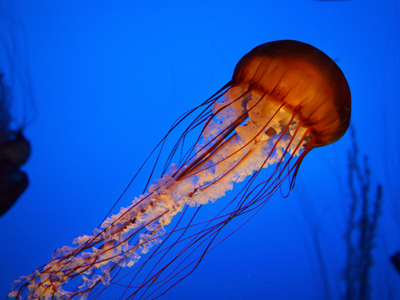
Ask the AI Tutor
Need help with Unit 2 - Speciation? Ask our AI Tutor!
AI Tutor - Lucy
Connecting with Tutor...
Please wait while we establish connection

Fossils from soft bodied animals, such as jellyfish, are rare.
Unit 2 - Speciation
This GCSE Biology quiz on speciation explores how new species form over time when populations become isolated, face different selection pressures, and gradually accumulate genetic differences.
1 .
A species is an interbreeding population capable of producing what?
Infertile offspring
Fertile offspring
No offspring
Mutants
Donkeys and horses are different species but can interbreed to produce a mule, but very few mules are fertile
2 .
Speciation is the formation of new...
varieties
forms
species
fossils
This happens through reproductive isolation and natural selection
3 .
Speciation can be studied using which of the following?
Fossils
Experiments
Observation
Recording data
The fossil record shows the adaptations over time which can lead to new species
4 .
What are fossils?
The remains of dead organisms from many years ago that are preserved in rocks
Plants found in coal and oil
Rocks and stones
Little creatures
DNA studies from human fossils have helped us to understand the relationships between the different anscestral species of modern humans
5 .
Species survive if they are...
well adapted
poorly adapted
not extinct
extinct
Well adapted means that they are suited to life in their environment
6 .
Which word describes species which have died off?
Redundant
Unemployed
Extinguished
Extinct
Badly adapted species will not breed successfully and so their genes will be removed from the gene pool by natural selection
7 .
Which of the following is not a cause of extinction?
Changes in the environment over geological time
New predators
Short term environmental changes
Disease
The environmental changes needed for extinction take place over many years
8 .
Fossils from soft bodied animals are...
common
rare
found everywhere
found in the sea
Soft bodied animals rarely leave a fossil behind as the body just decays. Bones, shells and plant parts are more easily preserved in rock and are more common
9 .
Which of the following is an example of geographical isolation?
A mountain separating two populations
The Sun
Fossilisation
Decay
An isolation mechanism is needed to separate the two populations so that they can evolve into two different species
10 .
Genetic variation provides the basis for new species. Variation means that individuals are...
the same
equal
different
adapted
Genetic variation is a random process. Changes that make an organism better adapted are more likely to be passed on to future generations by natural selection
**Unlimited Quizzes Await You! 🚀**
Hey there, quiz champ! 🌟 You've already tackled today's free questions.
Ready for more?
Ready for more?
🔓 Unlock UNLIMITED Quizzes and challenge yourself every day. But that's
not all...
not all...
🔥 As a Subscriber you can join our thrilling "Daily Streak" against other
quizzers. Try to win a coveted spot on our Hall of Fame Page.
quizzers. Try to win a coveted spot on our Hall of Fame Page.
Don't miss out! Join us now and keep the fun rolling. 🎉
**Unlimited Quizzes Await You! 🚀**
Hey there, quiz champ! 🌟 You've already tackled today's free questions. Ready for more?
🔓 Unlock UNLIMITED Quizzes and challenge yourself every day. But that's not all...
🔥 As a Subscriber you can join our thrilling "Daily Streak" against other quizzers. Try to win a coveted spot on our Hall of Fame Page.
Don't miss out! Join us now and keep the fun rolling. 🎉






